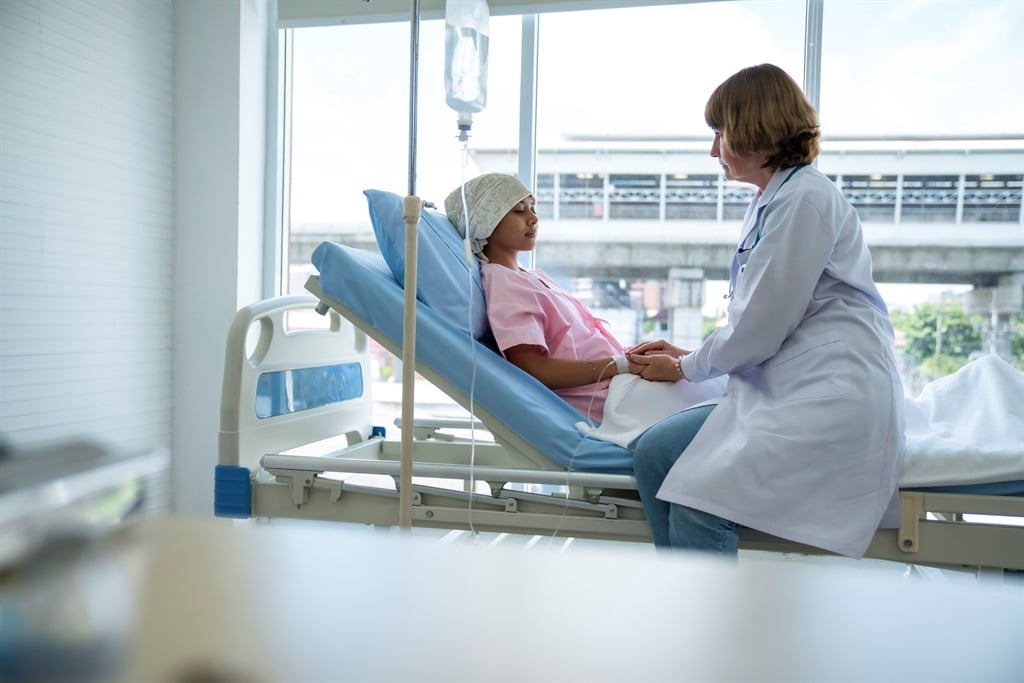
- South Africans struggle to access healthy foods, and this could put them more at risk of developing cancer.
- Experts say a healthy diet is one of the easiest ways to lower your risk of the disease.
- Saturday marks World Cancer Day - this year's theme is encouraging people to make lifestyle changes.
There is evidence that healthy eating can reduce your risk of cancer, but with rising food prices, many South Africans may find this lifestyle change beyond their reach, experts say.
Saturday marks World Cancer Day, with the global theme encouraging people to reduce their personal cancer risk through healthy living. This includes healthy eating habits, exercise and avoiding cancer-causing agents such as alcohol and tobacco, said the Cancer Association of South Africa (Cansa).
Lorraine Govender, Cansa's national manager of health promotion, said that obesity is a growing public health concern in South Africa, and many of the factors that lead to obesity could lead to colorectal cancer - cancer that starts in the colon or the rectum.
This is the second most prevalent cancer among men and the third most prevalent among women in South Africa, according to the 2019 National Cancer Registry.
"Cansa encourages public health authorities to educate consumers regarding the health risks posed by unhealthy products, including ultra-processed foods and sugar-sweetened beverages and to offer guidelines on healthier alternatives. This is especially in view of the fact that… these risk factors have been shown to increase the risk for this type of cancer," Govender explained.
Dr Yoshan Moodley, senior lecturer at Stellenbosch University's African Cancer Institute who has a special interest in gastrointestinal cancer, said that the lifestyles of South Africans have changed substantially over the past three decades, bringing with it an increased risk of noncommunicable diseases, including cancer.
The driving force behind the increase in gastrointestinal cancer amongst black South Africans has been a shift in diet towards a higher intake of unhealthy processed foods.
According to Moodley, some of the most popular processed foods, such as bacon and certain other processed meats, contain carcinogens (cancer-causing substances), which are linked to a higher risk of developing gastrointestinal cancer.
He said:
Moodley added that there is increasing evidence showing the importance of maintaining "good" bacteria in the gut to prevent gastrointestinal cancers.
"When we adopt unhealthy diets that are detrimental to the normal functioning of the good bacteria in our gut, it creates an environment that could support the development of gastrointestinal cancer."
Moodley stated there were a number of barriers which prevented segments of the population from accessing healthy food.
He said that in urban areas, access to healthy food can sometimes be challenging as there is very little space to grow healthy vegetables. Those who work long hours may also find it difficult to prepare meals made from fresh ingredients, which could see them opting for time-saving takeaways instead.
In addition, it can be expensive to purchase certain types of unprocessed and healthier foods, making it more difficult for poorer families to afford a healthier diet. He added that culture and personal preference could also play a role in dietary choices.
Moodley explained:
“We must increase access to healthy foods and educate the public about the role diet plays in the development of cancer. One way to increase access to fresh produce is through community gardens. Policymakers should consider placing a cap on the cost of certain types of healthy foods, such as vegetables, making them within reach of poorer households,” he said.
“We need to be cognisant that South Africa is a resource-constrained country, and there might be some resistance to implementing costly public health campaigns promoting healthy diets. However, if we start getting people to eat healthily now, then we will see the benefits in the long term and reduce the number of people with gastrointestinal cancers in the country.”
Gareth Coetzee, dietitian and research assistant at the University of the Western Cape School of Public Health, added that certain foods have been clearly linked to an increased risk of developing cancer.
He said:
"There are also foods that decrease one's risk for developing cancer. The regular consumption of wholegrains, fibre-containing foods, dairy products, vegetables and fruit decrease one's risk for developing cancer."
Vera Fordjour Afriyie, lecturer at the Human Nutrition and Dietetic Department at Nelson Mandela University, said food security means that households must have access to food, must be able to afford to purchase food, and must be able to utilise food optimally for them to be food secure.
A household in which there is undernourishment or obesity, or in which there is an illness that prevents someone from absorbing nutrients from their food optimally, would be considered as not having sufficient food utilisation.
“At a national level, South Africa is food secure. But this food is not reaching the households where it's needed. If there are households that are not food secure, it means South Africans are not meeting their dietary needs," she said.
She added:
Fordjour Afriyie added that South Africa's poverty levels, high unemployment rate and increasing food prices mean that many do not have access to the food they need.
According to the 2022 State of Food Security and Nutrition in the World, 65% of South Africans are unable to afford a healthy diet.
"This means that even if there is physical access to food, many South Africans do not have the financial means to afford healthy and nutritious foods," said Tamryn Frank, dietitian and researcher at the University of the Western Cape's School of Public Health and Centre of Excellence in Food Security.
She said:
In the National Food Consumption Survey 2022, over half of the survey respondents indicated that affording healthy food was an issue, and close to a third said availability of healthy foods was an issue.
According to Fordjour Afriyie, the first step in tackling food security is education and awareness. This includes making more nutritionists available at public healthcare facilities and enabling households to grow vegetables in their homes.
"We don’t have enough nutritionists in the public health care sector. In the long run, it would save the government money to hire more nutritionists instead of treating diseases caused by poor nutrition," she said.
"In the case of households that can't afford fruit and vegetables, that's where the government needs to step in and educate the public on producing their own foods. They could supplement grants with seeds to enable more people to grow vegetables at home."
Fordjour Afriyie stresses that meals should consist of starch, protein and fruits or vegetables, with the latter making up at least half of your plate. She suggests planning out meals for every week and looking for specials or bulk deals on fresh fruits and vegetables to make your shopping budget stretch further.
READ | Breast cancer: 5 tips from an expert on catching it early and keeping safe
Megan Pentz-Kluyts, nutrition and dietetics consultant at Cansa, said there are options for those who struggle to access healthy foods.
She suggested making changes such as substituting meat for legumes and pulses or using frozen vegetables instead of fresh produce. Pentz-Kluyts also suggested cutting out sugary drinks in favour of herbal teas and water.
Pentz-Kluyts said that a healthier lifestyle could also include the way food is prepared, such as avoiding deep frying food in oil or reducing salt intake. Both of these would also save you money, she stressed.
She also suggested including exercise, such as going for a walk, in your routine. For those living in areas where it may not be safe to run or walk, Pentz-Kluyts suggested dancing at home.
Frank added that healthy foods, such as fruits, vegetables, whole grains and foods high in fibre are known to be protective against cancer
Frank said:
"Conversely, foods such as processed meats which are known to increase one’s risk for cancer, are often eaten because they are a more affordable protein source than healthier alternatives. They also require less refrigeration and have a longer shelf-life which makes them a practical choice when factors such as the affordability and availability of electricity need to be considered. This means that low-income South Africans who have higher levels of food insecurity are most vulnerable to the effects."




 Publications
Publications
 Partners
Partners























